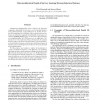Free Online Productivity Tools
i2Speak
i2Symbol
i2OCR
iTex2Img
iWeb2Print
iWeb2Shot
i2Type
iPdf2Split
iPdf2Merge
i2Bopomofo
i2Arabic
i2Style
i2Image
i2PDF
iLatex2Rtf
Sci2ools
114
click to vote
MICRO
2002
IEEE
2002
IEEE
Microarchitectural denial of service: insuring microarchitectural fairness
Simultaneous multithreading seeks to improve the aggregate computation bandwidth of a processor core by sharing resources such as functional units, caches, TLB and so on. To date, most research investigating the scheduling of these shared resources has focused on enhancing computational bandwidth. In this paper, we examine scheduling fairness. First, we show that a thread running on an implementation of a SMT processor can suffer from “denial of service” by a malicious thread, slowing down the original thread by a factor of 10-20. Using performance counter hardware, we show that the slowdown occurs because of deliberate misuse of shared resources and design decisions that are necessary for high speed implementation. We then propose and evaluate a number of mechanisms to counter such malicious behavior: some affect the core scheduling algorithm and others simply attempt to identify activity that would affect threads sharing the same processor core. We find that harmful activity ba...
| Added | 15 Jul 2010 |
| Updated | 15 Jul 2010 |
| Type | Conference |
| Year | 2002 |
| Where | MICRO |
| Authors | Dirk Grunwald, Soraya Ghiasi |
Comments (0)

